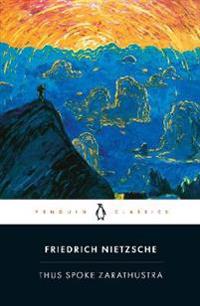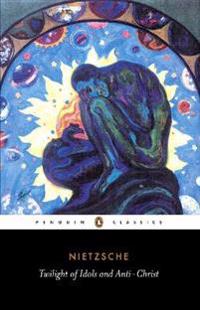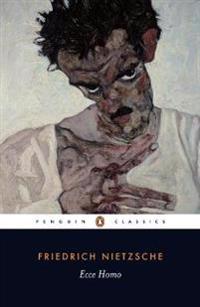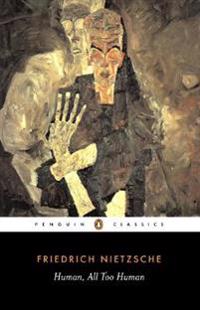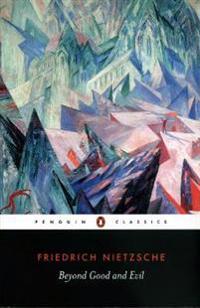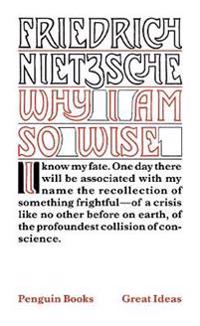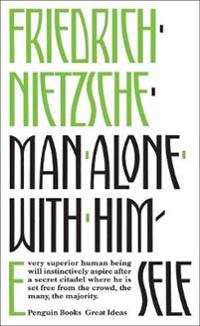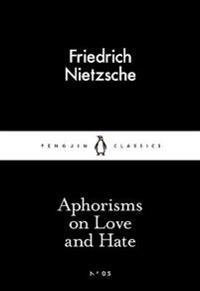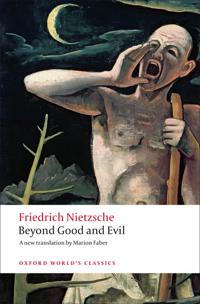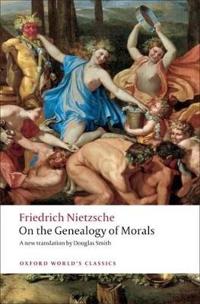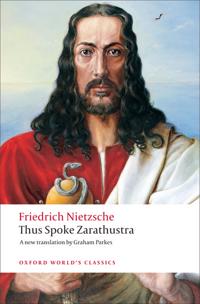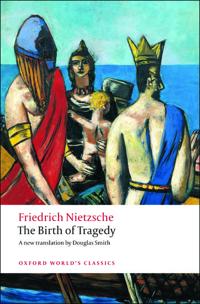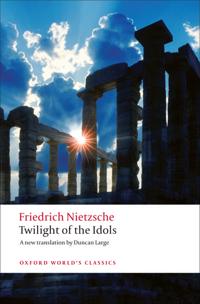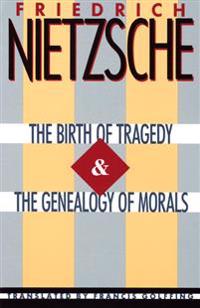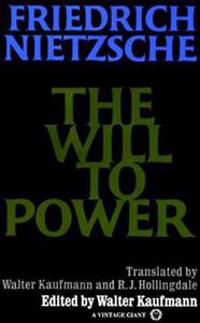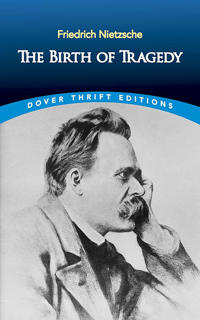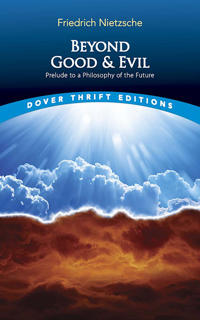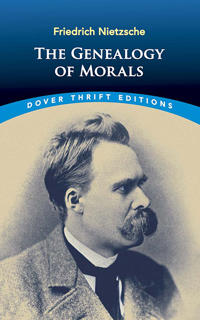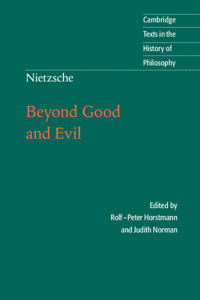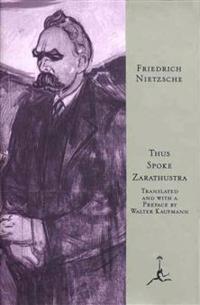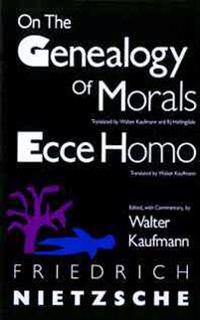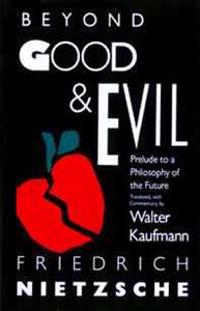Thus Spoke Zarathustra (Storpocket)
avFriedrich Wilhelm Nietzsche
ISBN: 9780140441185 - UTGIVEN: 197402Nietzsche was one of the most revolutionary and subversive thinkers in Western philosophy, and "Thus Spoke Zarathustra" remains his most famous and influential work. It describes how the ancient Persian prophet Zarathustra descends from his solitude in the mountains to tell the world that God is dea[...]
Twilight of Idols and Anti-Christ (Storpocket)
avFriedrich Wilhelm Nietzsche
ISBN: 9780140445145 - UTGIVEN: 199001"Twilight of the Idols", an attack on all the prevalent ideas of his time, offers a lightning tour of his whole philosophy. It also prepares the way for "The Anti-Christ", a final assault on institutional Christianity. Both works show Nietzsche lashing out at self-deception, astounded at how often m[...]
Ecce Homo (Storpocket)
avFriedrich Wilhelm Nietzsche
ISBN: 9780140445152 - UTGIVEN: 199211In late 1888, only weeks before his final collapse into madness, Nietzsche (1844 1900) set out to compose his autobiography, and Ecce Homo remains one of the most intriguing yet bizarre examples of the genre ever written. In this extraordinary work Nietzsche traces his life, work and development as [...]
Human, All Too Human (Storpocket)
avFriedrich Wilhelm Nietzsche
ISBN: 9780140446173 - UTGIVEN: 199409Written after Nietzsche had ended his friendship with Richard Wagner and had been forced to leave academic life through ill health, Human, All Too Human (1878) can be read as a monument to his personal crisis. It also marks the point when he matured as a philosopher, rejecting the German romanticism[...]
Beyond Good and Evil (Storpocket)
avFriedrich Wilhelm Nietzsche
ISBN: 9780140449235 - UTGIVEN: 200302"Beyond Good and Evil" confirmed Nietzsche's position as the towering European philosopher of his age. The work dramatically rejects the tradition of Western thought with its notions of truth and God, good and evil. Nietzsche demonstrates that the Christian world is steeped in a false piety and infe[...]
Why I am So Wise (Pocket)
avFriedrich Wilhelm Nietzsche
ISBN: 9780141018973 - UTGIVEN: 200409Throughout history, some books have changed the world. They have transformed the way we see ourselves and each other. They have inspired debate, dissent, war and revolution. They have enlightened, outraged, provoked and comforted. They have enriched lives and destroyed them. Now Penguin brings you t[...]
Man Alone with Himself (Pocket)
avFriedrich Wilhelm Nietzsche
ISBN: 9780141036687 - UTGIVEN: 200808Friedrich Nietzsche was one of the most revolutionary thinkers in Western philosophy. Here he sets out his subversive views in a series of aphorisms on subjects ranging from art to arrogance, boredom to passion, science to vanity, rejecting conventional notions of morality to celebrate the individua[...]
Aphorisms on Love and Hate (Häftad)
avFriedrich Wilhelm Nietzsche
ISBN: 9780141397900 - UTGIVEN: 2015-02'We must learn to love, learn to be kind, and this from our earliest youth...Likewise, hatred must be learned and nurtured, if one wishes to become a proficient hater.' This volume contains a selection of Nietzsche's brilliant and challenging aphorisms, examining the pleasures of revenge, the falsit[...]
Beyond Good and Evil (Pocket)
avFriedrich Wilhelm Nietzsche, Marion (TRN) Faber, Robert C. (INT) Holub
ISBN: 9780192832634 - UTGIVEN: 1999-02'What is done out of love always takes place beyond good and evil.' Always provocative, the Friedrich Nietzsche of Beyond Good and Evil (1886) is at once sceptical psychologist and philosopher-seer, passionately unmasking European society with his piercing insights and uncanny prescience. This maste[...]
Beyond Good and Evil (Pocket)
avFriedrich Wilhelm Nietzsche, Marion Faber, Robert C. Holub
ISBN: 9780199537075 - UTGIVEN: 200901'What is done out of love always takes place beyond good and evil.' Always provocative, the Friedrich Nietzsche of Beyond Good and Evil (1886) is at once sceptical psychologist and philosopher-seer, passionately unmasking European society with his piercing insights and uncanny prescience. This maste[...]
On the Genealogy of Morals (Häftad)
avFriedrich Wilhelm Nietzsche
ISBN: 9780199537082 - UTGIVEN: 200808'Reason, seriousness, mastery over the emotions, the whole murky affair which goes by the name of thought, all the privileges and showpieces of man: what a high price has been paid for them! How much blood and horror is at the bottom of all "good things!"' On the Genealogy of Morals (1887) is a book[...]
Thus Spoke Zarathustra (Häftad)
avFriedrich Wilhelm Nietzsche
ISBN: 9780199537099 - UTGIVEN: 200808'The profoundest book there is, born from the innermost richness of truth, an inexhaustible well into which no bucket descends without coming up with gold and goodness.' Thus Spoke Zarathustra (1885) was Nietzsche's own favourite among all his books and has proved to be his most popular, having sol[...]
The Birth of Tragedy (Häftad)
avFriedrich Wilhelm Nietzsche
ISBN: 9780199540143 - UTGIVEN: 200806'Yes, what is Dionysian? - This book provides an answer - "a man who knows" speaks in it, the initiate and disciple of his god.' The Birth of Tragedy (1872) is a book about the origins of Greek tragedy and its relevance to the German culture of its time. For Nietzsche, Greek tragedy is the express[...]
Twilight of the Idols (Häftad)
avFriedrich Wilhelm Nietzsche
ISBN: 9780199554966 - UTGIVEN: 200810'Anyone who wants to gain a quick idea of how before me everything was topsy-turvy should make a start with this work. That which is called idol on the title-page is quite simply that which was called truth hitherto. Twilight of the Idols - in plain words: the old truth is coming to an end...' Nietz[...]
The Will to Power (Häftad)
avFriedrich Wilhelm Nietzsche
ISBN: 9780394704371 - UTGIVEN: 197306Represents a selection from Nietzche's notebooks to find out what he wrote on nihilism, art, morality, religion, and the theory of knowledge, among others.[...]
The Routledge Companion to Epistemology (Inbunden)
avFriedrich Wilhelm Nietzsche
ISBN: 9780415962193 - UTGIVEN: 201101Epistemology, the philosophy of knowledge, is at the core of many of the central debates and issues in philosophy, interrogating the notions of truth, objectivity, trust, belief and perception. The Routledge Companion to Epistemology provides a comprehensive and the up-to-date survey of epistemology[...]
The Birth of Tragedy (Häftad)
avFriedrich Wilhelm Nietzsche
ISBN: 9780486285153 - UTGIVEN: 199510In The Birth of Tragedy Nietzsche expounds on the origins of Greek tragedy and its relevance to the German culture of its time. He declares it to be the expression of a culture which has achieved a delicate but powerful balance between Dionysian insight into the chaos and suffering which underlies a[...]
Beyond Good and Evil (Häftad)
avFriedrich Wilhelm Nietzsche
ISBN: 9780486298689 - UTGIVEN: 199802The great 19th-century philosopher refines his previously expressed ideal of the superman in one of his most important works, a fascinating examination of human values and morality. Publisher''s Note.
[...]The Genealogy of Morals (Häftad)
avFriedrich Wilhelm Nietzsche
ISBN: 9780486426914 - UTGIVEN: 200306Beyond Good and Evil (Pocket)
avFriedrich Wilhelm Nietzsche, Rolf-Peter Horstmann, Judith Norman
ISBN: 9780521779135 - UTGIVEN: 200112Beyond Good and Evil is one of the most scathing and powerful critiques of philosophy, religion, science, politics and ethics ever written. In it, Nietzsche presents a set of problems, criticisms and philosophical challenges that continue both to inspire and to trouble contemporary thought. In addit[...]
Thus Spoke Zarathustra (Inbunden)
avFriedrich Wilhelm Nietzsche, Walter Arnold Kaufmann
ISBN: 9780679601753 - UTGIVEN: 199606On the Genealogy of Morals/Ecce Homo (Pocket)
avFriedrich Wilhelm Nietzsche, Walter Arnold Kaufmann, R. J. Hollingdale
ISBN: 9780679724629 - UTGIVEN: 198912The great philosopher's major work on ethics, along with ECCE HOMO, Nietzche's remarkable review of his life and works. Translated by Walter Kaufmann.[...]
Beyond Good and Evil (Häftad)
avFriedrich Wilhelm Nietzsche
ISBN: 9780679724650 - UTGIVEN: 198912Represents Nietzsche's attempt to sum up his philosophy. In nine parts the book is designed to give the reader a comprehensive idea of Nietzche's thought and style. With an inclusive index of subjects and persons.[...]

